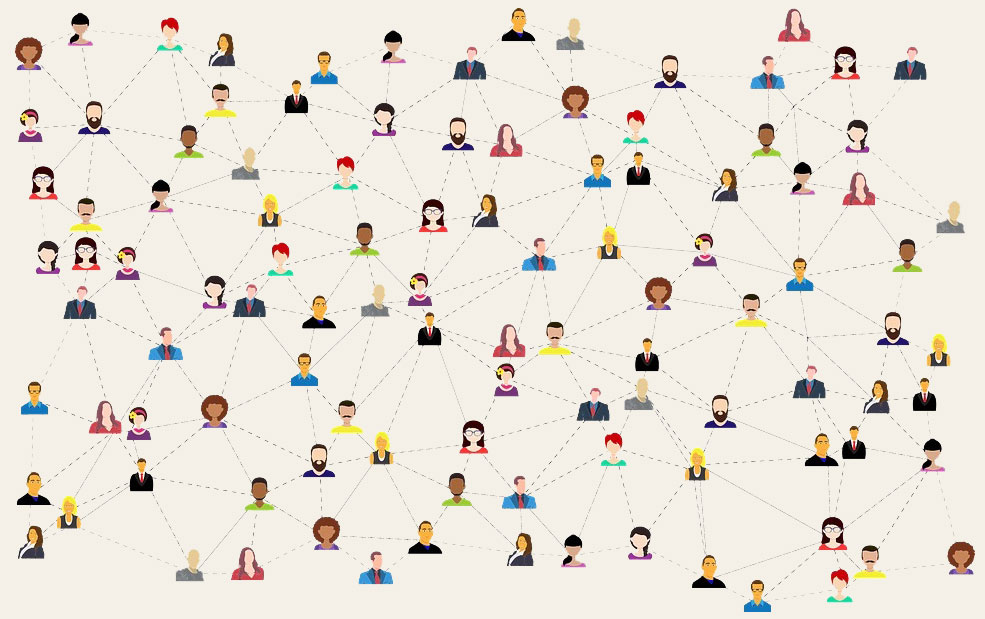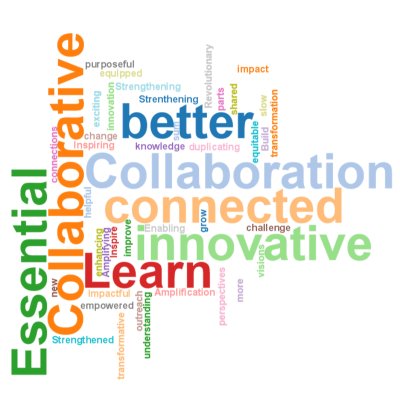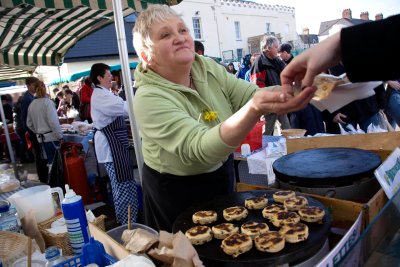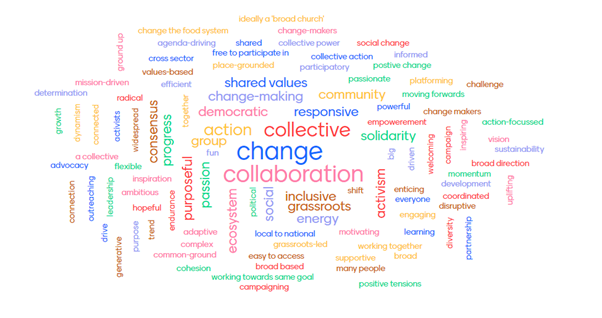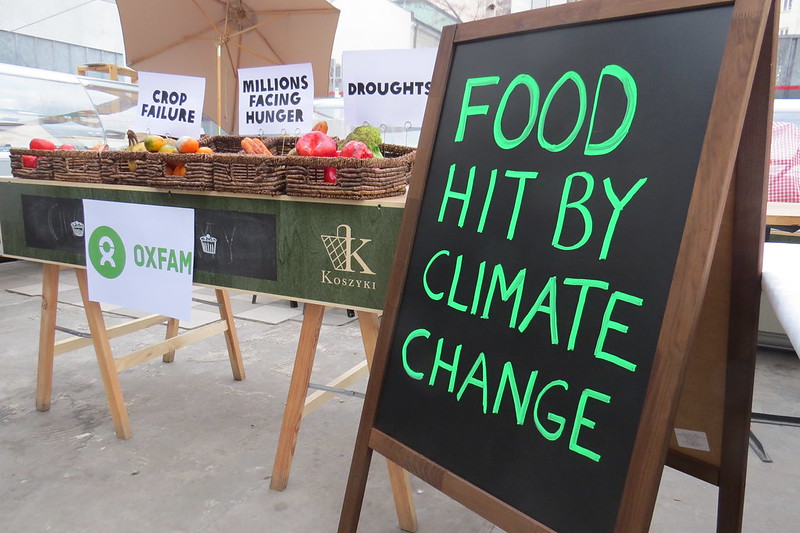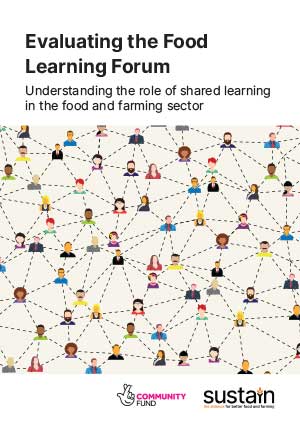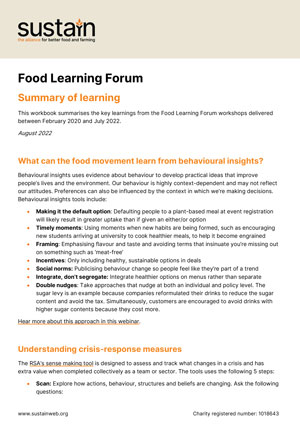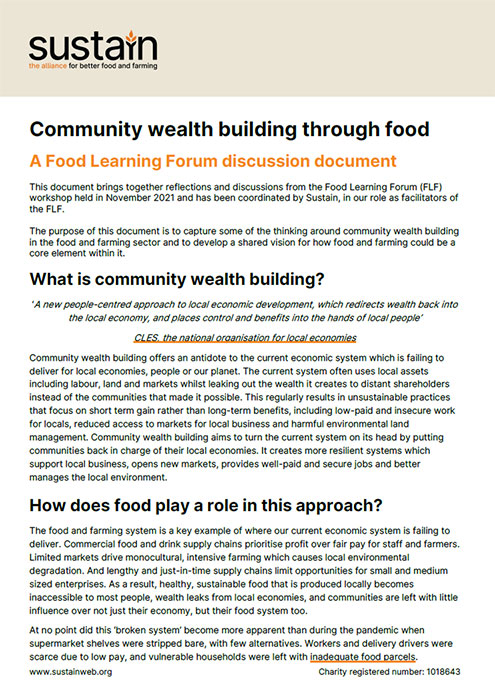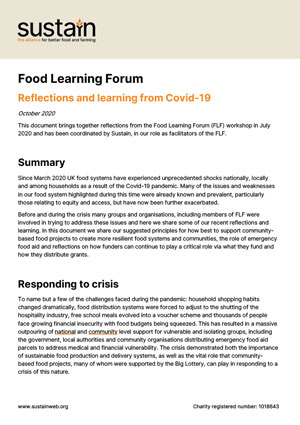What is the Food Learning Forum?
A space for national food-focused organisations to connect and share learning more effectively; to build relationships, connections and a bigger picture of the sector; to strengthen collaboration, create new ideas and develop strategic responses for our organisations, so we can explore key areas of opportunity and continue to tackle the food challenges of today and tomorrow.
Established in 2019 and initially funded by the National Lottery, this Forum is made up of organisations working to build a better, fairer, healthier food system.
Through workshops, webinars and learning networks, members and the wider alliance learn about a range of tools, topics and theories that can be applied to the food and farming sector.
Contact us
If you’d like to hear more about the Forum, any of our learning or to discuss how you can join, please get in touch.
Food Learning Forum events
How can you get involved?
The learning is intended to benefit everyone working to build a better food system, so we invite you to:
- Come to our next learning session.
- Watch and share our webinars to hear tools and tips from experts and examples of how organisations in the food and farming sector are putting these into practice and share them with your colleagues or community.
- Offer to present a session about some learning that you and your organisation have achieved, either on your own or with another organisation (we may be able to suggest someone relevant). We can avoid reinventing the wheel with every new project if we are willing to share mistakes as well as successes.
- Offer to co-facilitate a peer support group if you have a topic you would like to work on together with others to understand better.
- Read our summary of learning and access presentation slides and worksheets to use in your own teams or communities.
- Look at our vision for community wealth building through food and farming and let us know your thoughts – are we missing anything?
Who is involved?
The Forum is coordinated by Sustain and includes several national food and farming charities, previously or currently funded by the Big Lottery such as Food Ethics Council, Incredible Edible, Real Farming Trust, Alexandra Rose Charity and Local Welcome. Membership has widened and if you would like to benefit or get involved read on or contact us to find out more.
Topics
What can the food movement learn from behavioural insights?
The Behavioural Insights Team, showed us how to use evidence about behaviour to develop practical ideas to improve people’s lives and the environment. Behavioural insights tools include; framing, creating default options, making the most of timely moments, incentivising changes and integrating desired changes into existing structures.
Understanding crisis-response measures
In response to the pandemic, The Royal Society for the Encouragement of Arts, Manufacturers and Commerce (RSA) developed a sense making tool. It’s designed to assess and track changes in a crisis by scanning for change, evaluating the impact of this change, mapping the findings, tracking the changes and responding accordingly.
Download the tool here and watch this webinar to hear how Sustain projects, Food Power and Buckinghamshire County food partnership, put it to work.
Equality, diversity and inclusion in the food movement
Forum members are committed to increasing equality, diversity and inclusion and working together to ensure the food and farming sector is anti-racist. Through a workshop led by Brap, members discussed barriers to talking about race and used the workshop to constructively challenge ourselves and organisational approaches. Through continued conversations, members have reflected and shared progress made and challenges faced, including increasing inclusivity in their staff team and recruitment processes.
Sustain hosted this webinar exploring how we can better address diversity and inclusion within our organisations and as a sector.
A values-based approach to communicating climate change
Common Cause Foundation showed us how a values-based approach to communications can help make the climate and nature emergency matter to everyone. It encouraged us to become value setters by using the Schwartz values map, which groups values according to how closely people relate to them, to steer our audience to action.
Download one of their free online toolkits and watch our webinar to hear speakers impassioned calls to action on the climate and nature emergency.
Community organising in the food movement
Organising for Change introduced members to community organising, a means of building the capacity, motivation and agency of a community and getting other people involved that can also reflect their priorities and desires. At its core, organising should include: Listening to communities and working out who the communities you want to listen to are; Relationships and trust; And a culture of co-creation that provides a positive, inclusive environment for shared power.
Access the slides from this workshop for further detail on organising tools and watch our webinar.
Movement building in the food and farming sector
The Social Change Agency introduced us to the concept of movement building through the movement building canvas, which you can download for free. Defining a movement as a group of people who come together to advance an idea; coordinated activities that work toward a shared objective; or a societal shift where people change the way they think and act, this workshop outlined how to build a movement to be as effective as can be.
Watch this webinar or read this blog for a summary.
Community wealth building through food and farming
Communities and councils across the UK are exploring the potential of community wealth building in building local economic resilience. Recognising the role food could play in such an approach, Forum members took part in a workshop to discuss what community wealth building could look like through food. Discussions were used as the basis for this discussion document which we hope can build consensus around how community wealth building can be delivered through food and understand how the food and farming sector can make this a reality. You can also read this blog on the topic or watch this webinar.
Participatory approaches in the food and farming movement
Much of our work in the food and farming movement aims to build a better, fairer food system, but how can we do that if we are not doing that work together. Forum members, Church Action on Poverty and the Food Ethics Council, introduced participation and participatory highlighting that those who are affected by something, are best placed to design the solutions. Tools through which we can do that include participatory project-management, grant making or even budgeting, amongst other things. See the workshop presentation slides.
Monitoring and evaluation in the food and farming movement
If we’re going to build a more just and equitable food system then we need to understand the impact we’re having. That requires monitoring and evaluation. Students Organising for Sustainability shared their expertise on monitoring and evaluation, introducing the logic model, and measurement plans that can be incorporated into project design and delivery. Watch the workshop and download the toolkit.
Building and maintaining effective cross-sector partnerships
Sometimes we need to look beyond our movement to affect change. This can involve building cross-sector partnerships. This workshop explored some of the benefits of working across sectors, as well as the challenges, with examples from the Alliance to Save our Antibiotics and the Pesticide Collaboration.
Sowing the seeds for successful advocacy
Advocacy can mean different things to different people. This workshop, facilitated by expert campaigner and consultant Barbara Crowther, helped us explore what advocacy is, why we do it, the different types of advocacy, and the tools available. It highlighted the need for a clear plan, from exploring the problem and solution, to identifying targets and choosing framing and communications. Find out more in this advocacy toolkit.
Utilising co-design and co-production techniques
Building on our exploration of participatory approaches, this session went one step further to introduce co-design and co-production. These models of working work with people with lived experience of a problem to define the problem, identify a solution, and in some cases, implement that solution. These approaches ensure more buy-in from and ensure effective solutions are built that will really meet the needs of the community they are built to serve. Read examples of co-production in action from Food for Life Get Togethers and Hull Food Partnership.
